By:
- Judy Piercey
Published Date
By:
- Judy Piercey
Share This:

Shown is an electrochemical biosensor developed by primeUC finalist Biolinq. Photo by Biolinq
UC San Diego Entrepreneurs Pitch Their Technologies in $300,000 primeUC Competition
Biolinq, Cocoon Cam, Dermala and Hush were among 20 finalists
On Dec. 2, four UC San Diego-affiliated entrepreneurs participated in a University of California program designed to give a boost to some of the system’s most promising life-science startups. The reward: a $150,000 purse for the grand prize winner, with three runner-ups each winning $50,000.
The daylong competition, held at UC San Francisco’s Mission Bay campus, was the inaugural event for primeUC, launched by the University of California to give entrepreneurs from all 10 UC campuses and the three affiliated national laboratories a stage to present their technologies to the public and a chance to win seed funding to help them get their ventures off the ground.
The competing finalists were chosen from more than 260 entrants who submitted pitch decks designed to highlight the entrepreneurs’ ingenuity and business savvy. A panel of judges selected the 70 most promising semifinalists and further narrowed the field to 20 finalists, which included UC San Diego’s Biolinq, Cocoon Cam (also affiliated with UC Berkeley), Dermala and Hush. The competition culminated in a public fast-pitch event emceed by University of California President Janet Napolitano, followed by the announcement of the winners, including UCLA-affiliated Spinal Singularity, which was awarded the grand prize.
The competition, part of UC President Janet Napolitano’s Innovation and Entrepreneurship initiative, is one of the ways that UC is working to help its budding entrepreneurs launch successful companies.
“I’m a big believer in giving more than just verbal support to these impressive members of the UC community and their important work,” said Napolitano in her introduction to the awards event. “This work deserves not only our recognition, but also our concrete support.”
PrimeUC was hosted by QB3, the University of California research institute and life-science accelerator headquartered at UCSF Mission Bay; the prize money was provided by Johnson & Johnson Innovation.
Although none of the UC San Diego finalists were prizewinners, the competition provided networking opportunities and presentation experience critical to obtaining seed funding for their startups. The event also highlighted the collaboration, risk taking and innovation that play a key role in our campus culture.
Below is a snapshot of each of the four UC San Diego primeUC finalists offered by their competition presenters:
Biolinq
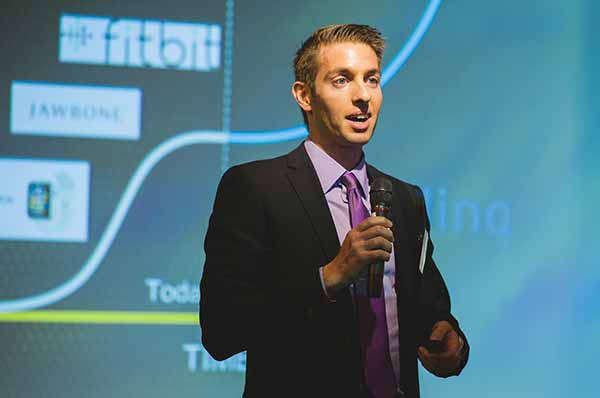
Joshua Windmiller, Co-founder and Chief Technology Officer, Biolinq Inc. Photo by Biolinq
Competition presenter: Joshua Windmiller, Co-founder and Chief Technology Officer, Biolinq Inc. A four-time alumnus of UC San Diego, Windmiller earned a B.S., M.S. and doctorate in electrical engineering; he also did a postdoctoral fellowship in NanoEngineering.
Company description: Biolinq Incorporated (La Jolla, CA), founded as Electrozyme LLC in 2012, is an early-stage startup devoted to the development of novel electrochemical sensor and biosensor paradigms for applications in diverse verticals including the healthcare, wellness, sports / fitness, military, environmental monitoring, and forensics domains. The company leverages its core competencies, which includes its extensive expertise in computational systems, physiology and chemometrics, its ability to synthesize solid-state biosensors containing engineered surfaces exhibiting selectivity towards chemical constituents in various samples, and its ability to scale its bio-/sensor paradigms by leveraging widely-deployed, low-cost manufacturing paradigms. An IP-driven company, Biolinq is proactively engaged in various stages of technology development, scientific validation and system integration.
UC San Diego resources that helped to spur entrepreneurial efforts: The von Liebig Entrepreneurism Center, as well as the Gordon Engineering Leadership Center, were instrumental in supporting my development as an aspiring engineer- / scientist-turned entrepreneur. Both centers provided the resources, training and networking opportunities essential to fostering my ambitions to transition my doctoral and postdoctoral research at the Jacobs School to launch Biolinq’s commercialization trajectory.
What it means to be a founder of a startup: Although it might sound cliché, being a startup founder is like drinking out of a firehose. Although I’m a technologist at heart, the truth of the matter is I spend a limited amount of my time on technology development; much of my time is consumed in the operational logistics associated with running a productive business venture, which includes fundraising, marketing, business development and clinical/regulatory affairs, not to mention leading a stellar team of world-class engineers and scientists. As a startup founder, one must remain committed to their vision while being adept at quickly synthesizing and making suitable use of new information as it materializes. In this vein, a startup founder must be willing to be placed in situations outside of their comfort zone and/or domain of expertise and hence must be willing and able to adapt to a changing customer environment or technology landscape. The theory of “survival of the fittest” certainly applies to startup ventures, not to mention business, in general.
Cocoon Cam
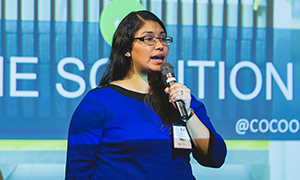
Rubi Sanchez, Co-Founder and CEO of Wearless Tech Inc., developer of Cocoon Cam. Photo by Eugene Borodin/QB3
Competition presenter: Rubi Sanchez, Co-founder/CEO, Wearless Tech Inc. Sanchez received a B.A. from UC Berkeley and was a fellow at the Stanford University Graduate School of Business program focused on business leaders interested in building highly scalable companies. Company co-founder Pavan Kumar is the UC San Diego connection—he earned an M.S. in Computer Science from the Jacobs School of Engineering.
Company description: Cocoon Cam is a smart camera and phone application duo that tracks your baby’s movement and vitals straight from the camera without the need of a mat or invasive wearable sensor. This is made possible by their proprietary software, which detects an array of vitals. The company founders recently demonstrated their technology to President Obama at the White House and have begun a pilot program with super excited early customers. The baby monitor is just the beginning. Cocoon Cam has been approached by various companies that would like to incorporate Cocoon Cam’s software into their solution, making them confident that they will be able to expand into other markets. Co-founder Siva Nattamai came up with the idea when he had his daughter.
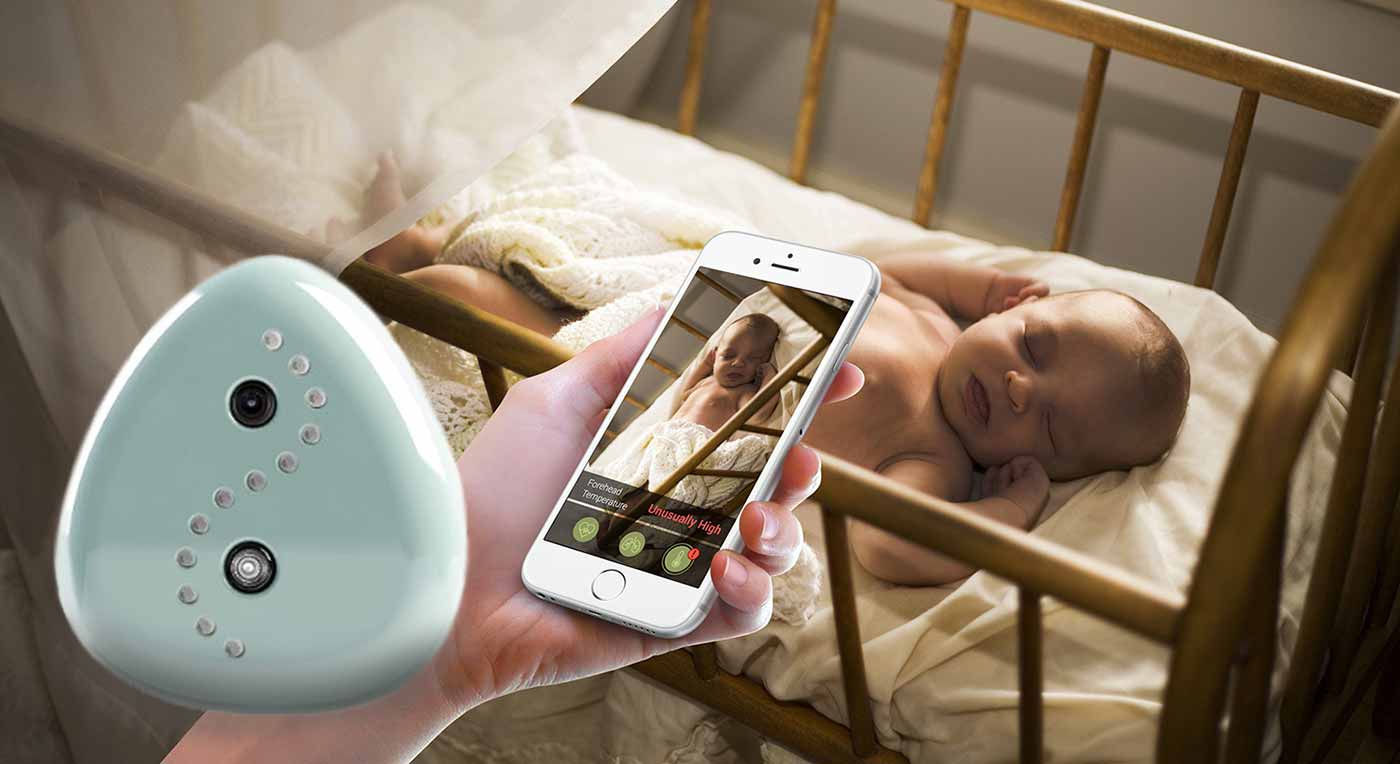
Cocoon Cam is a smart camera and phone application duo that tracks baby’s movement and vitals straight from the camera. Photo by Cocoon Cam
UC San Diego resources that helped to spur entrepreneurial efforts: During the von Liebig I-Corps program we identified a strategy for bringing Cocoon Cam to market. We were mentored by entrepreneur Dennis Abremski and Computer Science and Engineering research scientist and lecturer Dr. Nadir Weibel.
What it means to be a founder of a startup: Being the founder of a startup means acknowledging that you don’t know everything and finding folks that can fill in specific knowledge and experience gaps to accelerate your growth.
Dermala
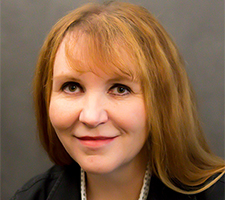
Lada Rasochova, Co-founder and CEO of Dermala. Photo by Lada Rasochova
Competition presenter: Lada Rasochova, Co-founder CEO, Dermala Inc. Rasochova earned an MBA from the Rady School of Management at UC San Diego. She has a doctorate in Microbiology/Virology from Iowa State University.
Company description: Dermala Inc. is a spinout from UC San Diego. Dermala utilizes the human microbiome to develop treatments for chronic skin diseases that are associated with defects—dysbiosis—in the skin microbiome. Dermala has built a proprietary platform that enables discovery of beneficial strains in the skin microbiome, antimicrobial and anti-inflammatory microbial metabolites, and prebiotic compounds that can correct the dysbiosis, treat disease symptoms and prevent disease recurrence. Dermala’s rational design of microbiome-based therapies will fundamentally transform the way chronic skin diseases are treated and prevented. Dermala’s product pipeline includes acne, atopic dermatitis, chronic wound infections, including MRSA, and other chronic skin diseases.

Petri plate with colonies of Propionibacterium acnes that has been linked to the skin condition of acne. Photo by Dermala
UC San Diego resources that helped to spur entrepreneurial efforts: Dermala was co-founded by Dr. Lada Rasochova—Dermala’s CEO, Executive Director of California Institute for Innovation and Development, Rady School of Management and Rady School alum—and Dr. Chun-Ming “Eric” Huang, Professor, Division of Dermatology, UC San Diego School of Medicine. Dermala licensed rights to the core technology, developed by Dr. Huang, from the University of California. Dermala has had access to the world-renowned experts and state-of-the-art scientific expertise at UC San Diego, including the recently formed Center for Microbiome Innovation, Dermatology Clinical Trials Unit, Department of Dermatology, as well as expert business advisors at the Rady School of Management, and mentors associated with StartR and mystartupXX accelerators. Dermala is located in JLABS, the Johnson & Johnson Innovation Center incubator in San Diego.
What it means to be a founder of a startup: Prior to founding Dermala, I spent more than 15 years in drug development in industry. Being in a startup company presents unique challenges. Having a great team is crucial. I am lucky to work with an amazing team at Dermala. I am also fortunate to have great advisors and collaborators, including those at UC San Diego. Human microbiome is such an exciting and promising field. We have a very real opportunity to translate scientific discoveries from UC San Diego into products that will improve lives of millions of people around the world.
Hush
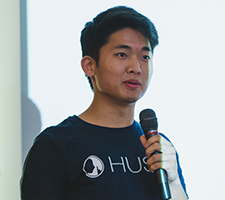
Daniel Lee, Co-founder and CEO, Hush Technology Inc. Photo by Eugene Borodin/QB3
Competition presenter: Daniel Lee, Co-founder/CEO, Hush Technology Inc. Lee earned a B.S. in Mechanical Engineering from UC San Diego. The other co-founders include Daniel Synn and Daniel Chesong Lee, who both attended UC San Diego as engineering majors.
Company description: Hush creates the world’s first smart earplugs that combine a soothing sound machine with earplugs to block out noise that keeps you up at night, whether it’s a snoring partner or loud neighbors. By connecting wirelessly with your smartphone, Hush lets you still hear notifications such as your alarm clock or an emergency phone call. Hush lets you block out the world but still hear what you need for a truly peaceful sleep.
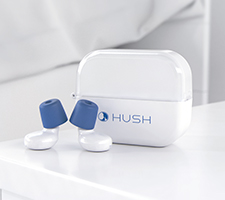
Hush created the world’s first smart earplugs that combine a soothing sound machine with earplugs. Photo by Hush
UC San Diego resources that helped to spur entrepreneurial efforts: Hush started initially as a class project out of MAE 154, an entrepreneurship undergraduate course run by Dr. Nathan Delson of the Mechanical and Aerospace Engineering department. From there, Hush got involved in all of the resources offered by the school, from the Moxie Center, to Von Liebig, to BrightEyes, to the E-Challenge. There’s a lot of entrepreneurial support offered by the school if you reach out to actively use them.
What it means to be a founder of a startup: Being a founder of a startup means you get to do your own thing. While that’s good in a lot of ways, it also means you are fully responsible for the outcome and when things don’t go right, which happens all the time, you’re the one left to clean up the trash and somehow make things work out.
Share This:
Stay in the Know
Keep up with all the latest from UC San Diego. Subscribe to the newsletter today.



